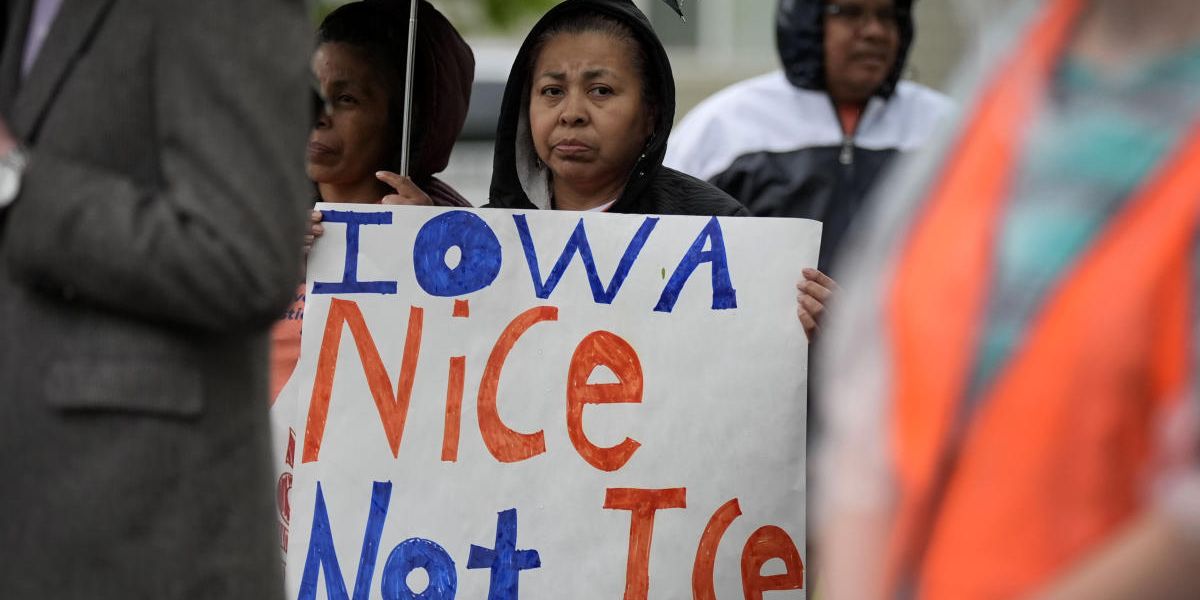In two distinct lawsuits filed on Thursday, the Department of Justice and civil rights organizations sought to prevent the implementation of SF 2340, a contentious immigration law, in Iowa.
SF 2340 gives local law enforcement the right to detain immigrants who have previously been refused entrance, deported, or removed from the nation. Additionally, it grants judges the authority to order the return of an individual to the nation from which they first entered the United States.
It is also not against the law to charge minors.
The DOJ’s lawsuit was filed barely one week after ABC News received a letter from Principal Deputy Assistant Attorney General Brian Boynton pushing Governor Kim Reynolds to veto the measure by May 7 or risk legal action.
The measure, which was approved by state legislators last month and signed by Governor Kim Reynolds, is set to take effect on July 1.
“Iowa cannot disregard the U.S. Constitution and settled Supreme Court precedent,” Boynton stated. “We have brought this action to ensure that Iowa adheres to the framework adopted by Congress and the Constitution for regulation of immigration.”
The legislation was heavily influenced by a Texas statute of a similar nature, Senate Bill 4, or SB 4, which is presently being blocked from taking effect while the courts determine whether it is constitutional.
That statute, which permits local law enforcement agents to detain immigrants they believe are entering the country illegally, was also sued by the Department of Justice. It gives judges the authority to order someone’s expulsion from the nation, just like the Iowa law does.
The Iowa Migrant Movement for Justice and two individuals it represents were the targets of a separate lawsuit filed early on Thursday by the American Immigration Council, American Civil Liberties Union, and the ACLU of Iowa.
The group’s attorneys said in the complaint that the statute does not include any exceptions for those who have been refused entry or deported in the past but have since received permission to remain in the nation.
Read Also: Major Changes in Electricity Billing for Californians Approved by Regulators
According to the groups, this implies that those who possess green cards, belong to a protected class, or have been given refuge may also face arrest and imprisonment.
The case tells the tale of an 18-year-old immigrant from Honduras whose sister was abducted and her father was killed in her own nation. The ACLU claims that although she entered the country at the age of 14, she was deported. Later, she returned to the United States on her own and was given refuge.
According to the legislation, a conviction would result in a term of two to ten years in prison. According to the statute, if an offender’s removal occurred “subsequent to a conviction for commission of two or more misdemeanors involving drugs, crimes against a person, or both,” they might face up to five years in jail as a Class D felony.
Others may face up to ten years in prison if they are charged with a Class C felony.
“This ugly law is deeply harmful to Iowa families and communities. Iowa lawmakers knowingly targeted people who are protected by federal immigration laws and who are legally allowed to be here, like people granted asylum, or special visas given to survivors of domestic violence or other crimes,” ACLU of Iowa Legal Director Rita Bettis Austen stated. “And there are lots of good reasons — related to foreign relations, national security, humanitarian interests, and our constitutional system — why the federal government enforces our immigration law, instead of all 50 states going out and doing their own thing to enforce their own separate immigration schemes. It’s hard to overstate how awful and bizarre this law is.”












Leave a Reply